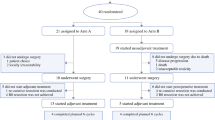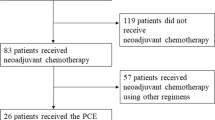Abstract
Background: It has been demonstrated that the 3-weekly PELF regimen is superior to FAM and FAMTX in advanced gastric cancer. The aim of this multicentric phase II study was to evaluate the efficacy and tolerability of a PELF regimen, given every 2 weeks as a first-line therapy in patients with unresectable or metastatic gastric carcinoma. Methods: Fifty-nine patients were treated with the following schedule: cisplatin (40 mg/m2, day 1), epirubicin (30 mg/m2, day 1), 5-fluorouracil (400 mg/m2 bolus, followed by 600 mg/m2, 22 h continuous infusion, day 1 and 2) and folinic acid (100 mg/m2, 2-h infusion, day 1 and 2). G-CSF (5 μg/kg) was administered on day 6, 8, 10, and 12. Cycles were repeated every 2 weeks for a maximum of twelve courses. Results: Of the 52 evaluable patients, three (5.8%) complete responses, and 15 (28.8%) partial responses were observed, for an overall response rate of 34.6%. The median duration of response was 8 months. Nineteen patients had stable disease and 15 progressed on therapy. At a median follow-up of 12 months, the median time to progression was 8 months and the median survival duration was 13 months, with a 1-year survival rate of 53.5%. Grade 3 or 4 observed toxicities were: neutropenia in 26 patients (44%), thrombocytopenia in four patients (6.7%), and mucositis in seven patients (11.9%). Conclusions: The bi-weekly PELF regimen seems to be feasible with an acceptable toxicity profile and an activity comparable to the 3-weekly schedule.
Similar content being viewed by others
References
Shipper DL, Wagener JS (1996) Chemotherapy of gastric cancer. Anticancer Drugs 7:137–149
Cocconi G, Bella M, Zironi S et al (1994) Fluorouracil, doxorubicin, and mitomycin combination versus PELF chemotherapy in advanced gastric cancer: a prospective randomized trial of the Italian Oncology Group for Clinical Research. J Clin Oncol 12:2687–2693
Cocconi G, Carlini P, Gamboni A et al (2003) Cisplatin, epirubicin, leucovorin and 5-fluorouracil (PELF) is more active than 5-fluorouracil, doxorubicin and methotrexate (FAMTX) in advanced gastric carcinoma. Ann Oncol 14:1258–1263
Cascinu S, Labianca R, Alessandroni P et al (1997) Intensive Weekly Chemotherapy or Advanced gastric Cancer Using Fluorouracil, Cisplatin, Epi-Doxorubicin, 6S-leucovorin, glutathione, and filgrastim: a report from the Italian group for the study of digestive tract cancer. J Clin Oncol 15:3313–3319
De Gramont A, Bosset JF, Milan C et al (1997) Randomized trial comparing monthly low-dose leucovorin and fluorouracil bolus with bimonthly high-dose leucovorin and fluorouracil bolus plus continuous infusion for advanced colorectal cancer: a French Intergroup Study. J Clin Oncol 15:808–815
Louvet C, De Gramont A, Demuynck B et al (1991) High-dose folinic acid, 5-fluoruracil bolus and continuous infusion in poor-prognosis patients with advanced measurable gastric cancer. Ann Oncol 2(3):229–230
Mitry E, Taieb J, Artru P et al (2004) Combination of folinic acid, 5-fluorouracil bolus and infusion, and cisplatin (LV5FU2-P regimen) in patients with advanced and gastric and gastroesophageal junction carcinoma. Ann Oncol 15:765–769
Cascinu S, Baldelli AM, Catalano V et al (2002) Infusional 5-fluorouracil, cisplatin and mitomycin C in advanced gastric cancer: a low cost effective regimen. Br J Cancer 86:213–217
Calabresi F, Papaldo P, Marolla P et al (1995) Different schedules of G-CSF in adjuvant breast cancer therapy with high-dose epirubicin + cyclophosphamide +/- lonidamine (meeting abstract). Proc Am Soc Clin Oncol 14:257 (abstr 698)
Miller AB, Hoogstraten B, Staquet M, Winkler A (1981) Reporting results of cancer treatment. Cancer 47:207–234
Simon S (1989) Optimal II stage designs for phase II clinical trials. Controlled Clin Trials 10:1–10
Webb A, Cunningham D, Scarffe JH et al (1997) A randomized trial comparing ECF with FAMTX in advanced esophagogastric cancer. J Clin Oncol 15:261–267
Vanhoefer U, Rougier P, Wilke H et al (2000) Final results of a randomized phase III trial of sequential high dose methotrexate, fluorouracil, and doxorubicin versus etoposide, leucovorin, and fluorouracil versus infusional fluorouracil and cisplatin in advanced gastric cancer: a trial of the European Organization for Research and Treatment of Cancer Gastrointestinal Tract Cancer Cooperative Group. J Clin Oncol 18:2648–2657
Wilke HJ, Van Cutsem E (2003) Current treatments and future perspectives in colorectal and gastric cancer. Ann Oncol 14(suppl 2):ii49–ii55 (in review)
Sobrero AF, Aschele C, Bertino JR (1997) Fluorouracil in colorectal cancer: a tale of two drugs implication for biochemical modulation. J Clin Oncol 15:368–381
Morstyn G, Campbell L, Souza LM et al (1988) Effect of granulocyte colony stimulating factor on neutropenia induced by cytotoxic chemotherapy. Lancet 1(8587):667–672
Marty M (1994) The optimal dose of glycosylated recombinant human granulocyte colony stimulating factor for use in clinical practice: a review. Eur J Cancer 30A(Suppl 3):S20–S25
Kohne CH, Catane R, Klein B et al (2003) Irinotecan is active in chemonaive patients with metastatic gastric cancer: a phase II multicentric trial. Br J Cancer 89(6):997–1001
Ajani JA, Van Cutsem E, Moiseyenko V et al (2003) Docetaxel (D), cisplatin, 5-fluorouracil compare to cisplatin (C) and 5-fluorouracil (F) for chemotherapy-naïve patients with metastatic or locally recurrent, unresectable gastric carcinoma (MGC): interim results of a randomized phase III trial (V325). Proc Am Soc Clin Oncol 22: 249 (abstr 999)
Kollmannsberger C, Quietzsch D, Haag C et al (2000) A phase II study of paclitaxel, weekly, 24-hour continous infusion 5-fluorouracil, folinic acid and cisplatin in patients with advanced gastric cancer. Br J Cancer 83:458–462
Schoffski P (2002) New drugs for treatment of gastric cancer. Ann Oncol 10:13–22
Acknowledgements
We thank Prof. Giorgio Cocconi, Dr. Gianluigi Ferretti and Dr. Maria Simona Pino for their helpful comments on an earlier draft of the manuscript.
Author information
Authors and Affiliations
Corresponding author
Rights and permissions
About this article
Cite this article
Felici, A., Carlini, P., Ruggeri, E.M. et al. Bi-weekly chemotherapy with cisplatin, epirubicin, folinic acid and 5-fluororacil continuous infusion plus g-csf in advanced gastric cancer: a multicentric phase II study. Cancer Chemother Pharmacol 57, 59–64 (2006). https://doi.org/10.1007/s00280-005-0032-5
Received:
Accepted:
Published:
Issue Date:
DOI: https://doi.org/10.1007/s00280-005-0032-5




